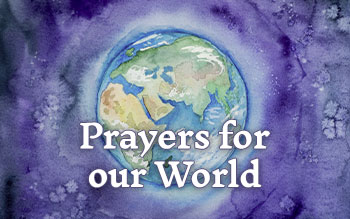Displaying items by tag: women's rights
Afghanistan: two years after US withdrawal
30 August was the two-year anniversary of the US withdrawal from Afghanistan. Despite promises of a more moderate rule, Taliban leaders have imposed harsh measures. ‘It’s not a very good time in Afghanistan because of the hopelessness, the fear. People are tired of Islam,’ says Mina, an Afghan Christian working with Global Catalytic Ministries. ‘At first, I was feeling sorry for myself. I cried for three weeks. Then God’s grace opened my eyes.’ In June, Taliban supreme leader Hibatullah Akhundzada described Afghanistan’s conditions as comfortable for women according to the Islamic Shariah: ‘The status of women as a free and dignified human being has been restored, and all institutions have been obliged to help women in securing marriage, inheritance and other rights.’ However the Taliban removed girls from school, barred women from public spaces, and cracked down on media freedoms. Earlier this year, officials banned women like Mina from the workplace.
Saudi Arabia: UN worried about activist’s health
A Saudi women’s rights activist, Loujain al-Hathloul (31), was arrested along with about a dozen other female activists in May 2018. She has been on hunger strike for a week, and on 5 November her health was said to be rapidly worsening. UN experts are calling for her immediate release. She was arrested just weeks before Saudi Arabia lifted a decades-old ban on female drivers, yet she is still in prison. Her deteriorating health was ‘deeply alarming’, said the UN Committee on the Elimination of Discrimination against Women (CEDAW). The committee, made up of 23 independent experts, also voiced serious concern ‘by recent information concerning the conditions of Ms al-Hathloul’s prolonged detention, including reports that she is not allowed regular contact with her family’. Some activists arrested with her were provisionally released. Others remain in detention, subjected to waterboarding, sexual harassment, and court trials for contacting media, diplomats and human rights groups.
Afghanistan: Women Activists Fear Return Of Repressions
Khalida Khorsand, a 35-year-old rights activist from the western Afghan city of Herat, is skeptical about Taliban claims that it has dispensed with its strict rules against girls' education and women working.
The militant Islamic group made the declaration in the midst of recent peace talks with U.S. envoy Zalmay Khalilzad aimed at bringing an end to the long U.S. military presence in Afghanistan.
But Khorsand still remembers the notorious repressions under Taliban rule as a teenager in the western city of Herat when she risked the death penalty to study literature in a class disguised as a women's sewing group.
"After nearly 18 years without the Taliban in power, we now see that the Taliban are coming back in Afghanistan and there haven't been big changes for women's lives -- especially in rural areas," says Khorsand, who has dedicated much of her life since 2001 to advancing women's rights in western Afghanistan.
Even without the Taliban in power in Herat, Khorsand says, many hard-fought gains for women since the collapse of the Taliban regime already are under threat.
She attributes that situation to what she calls "a Taliban way of thinking" by many Afghans and a proliferation of unregistered religious schools in Herat teaching "radical Islam" to as many as 50,000 young people.
If the Taliban gets a role in the Afghan government as part of a peace deal, as Khorsand expects, she fears a floodgate will be opened for resurgent "radical Islamists" in Herat.
"I don't know why this has been allowed to happen under the current government of Afghanistan since 2014," Khorsand laments. "They are not paying attention to the rise of fundamentalists and radical groups in Herat.
"Now the city has become a safe haven for the radical groups that support the ideology of the Taliban," Khorsand says. "The fundamentalist groups in Herat are very organized and have a lot of money. They take the young people into madrasahs and teach to them the principles of the Taliban, and they are having an enormous impact on the young generation."
Those groups already have gained backing from municipal authorities for an unofficial ban on live musical performances in Herat and for a ban on celebrating Valentine's Day -- with both practices being declared "unIslamic."
In rural areas of Herat Province, where Khorsand worked for years to help women who are victims of domestic violence, Khorsand says she has seen disturbing signs of support for the punishments doled out by the Taliban under its strict enforcement of Islamic Shari'a law -- amputating the hands of thieves, publicly flogging people for drinking alcohol, and stoning to death those who engage in adultery.
Students at Herat's madrasahs deny being radical Islamists. But they also support a return to the prohibitions and punishments of the Taliban era.
"Allah says cut off the hands of a male thief and a female thief," says Jan Agha Jami, a 21-year-old at the Fakhr al-Madares madrasah in Herat. "When men and women commit adultery, whip them if they are single. If they are married, they should be stoned, and the Koran's rulings should be implemented in public.
"Music concerts are absurd because they are forbidden," Jami tells RFE/RL. "Music is bad for the mind, memory, and even human psyche. When a girl performs in front of strangers, the whole society is corrupted."
Reflecting on the growing popularity of such beliefs in Herat, Khorsand says "it makes no difference for women in Afghanistan if the Taliban exists or doesn't exist."
"The Taliban's way of thinking about women is the way many people are thinking in Afghanistan," she says. "A lot of Afghans have traditional ways of thinking and they believe the talk of the Taliban. Unfortunately, much of their way of thinking is against the rights of women."
Move Forward, Step Back
To be sure, Khorsand says there have been important advances for Afghan women since 2001 -- including language in the Afghan Constitution that enshrines the right to education and to work.
Women are members of parliament and can be seen on television, competing in sports, and performing in concerts in Kabul.
But the Afghan government since the collapse of the Taliban regime has included many conservative Islamists and former warlords whose attitudes about women are similar to the Taliban.
Sima Simar, the head of Afghanistan's Independent Human Rights Commission, says the gains for women since 2001 can easily be overturned and have rarely been implemented in rural areas where most Afghans live.
The 2018 Women, Peace, and Security Index by Georgetown University and the Peace Research Institute of Oslo ranks Afghanistan as the second-worst place in the world to be a woman. Only Syria was ranked worse.
That study notes that only 16 percent of Afghanistan's workforce is female and that half of all Afghan women have four years or less of education.
UNICEF, the United Nations children's agency, says only half of school-aged Afghan girls now go to school, and that only one out of five girls under 15 are literate.
Nearly two out of three Afghan girls are married when they are teenagers or younger. On average, they are sent by their parents into arranged marriages between the ages of 15 and 16.
Most imprisoned Afghan women have been jailed for so-called "morality crimes," such as leaving an abusive husband or demanding to marry a man of their own choosing.
Pray: That the steady advances being made towards improving womens rights will not be overturned.
Pray: That boys and girls will get equal access to good education, especially in the rural areas.
Pray: For improved employment opportunities for women.
Pray: For those who work with and speak up for the oppressed women and children in Afghan society - that their voice will be heard and acted upon.
Saudi Arabia: app for men to monitor women
On 16 February Saudi Arabia defended a mobile app that allows men in the kingdom to track female relatives after rights groups and a US lawmaker criticised tech giants for offering it. The Absher app provides services for ‘all members of the society - including women, the elderly, and people with special needs’, according to the interior ministry. It is currently free, allows users to renew passports and visas, and eases a variety of other electronic services. But critics said that the app enables abuse against women and girls by allowing men to track their movements. US senator Ron Wyden called on Apple and Google to remove the app, arguing that it promotes ‘abusive practices against women’. Saudi women must have consent from a husband or male relative to renew passports or leave the country.
Suffragette mosaic in Birmingham
A giant mosaic (20 metres high), made up of thousands of photos of ‘inspiring’ women, has been unveiled. Depicting Hilda Burkitt, a militant suffragette, it is now on show at Birmingham New Street station, where she threw a stone at the prime minister's train in 1909. Named Face of Suffrage, the artwork includes 3,724 photos from the public, who had responded to an appeal by artist Helen Marshall. Ms Marshall said: ‘The photo is the face of a smiling Edwardian lady, but her story is far from what we might expect.’ Jailed for breaking a window of Herbert Asquith's train, Burkitt went on hunger strike and was force-fed 292 times while at Birmingham's Winson Green prison. Ms Marshall said she chose Burkitt as the subject of her piece after people she spoke to ‘really seemed to connect’ with the picture the mosaic is based on. It will be on display until 14 December, marking 100 years since some British women were allowed to vote in a general election for the first time.
Saudi Arabia elected to UN women’s rights commission
The United Nations voted late last week to place Saudi Arabia on the Commission on the Status of Women for a four-year term beginning in 2018, despite that country’s appalling record on the treatment of women. The director of the Geneva-based UN Watch expressed his outrage: ‘Electing Saudi Arabia to protect women’s rights is like making an arsonist into the town fire chief.’ Every Saudi woman must have a male guardian who makes all critical decisions on her behalf. Men control a woman’s life from her birth until death. Saudi Arabia even bans women from driving cars. The most recent human rights report notes that despite being allowed to participate in municipal elections in 2015, the state of women’s rights in the kingdom remains generally abysmal. In 2015, Saudi Arabia reduced a Sri Lankan woman’s sentence for adultery from execution by stoning to three years in prison.





